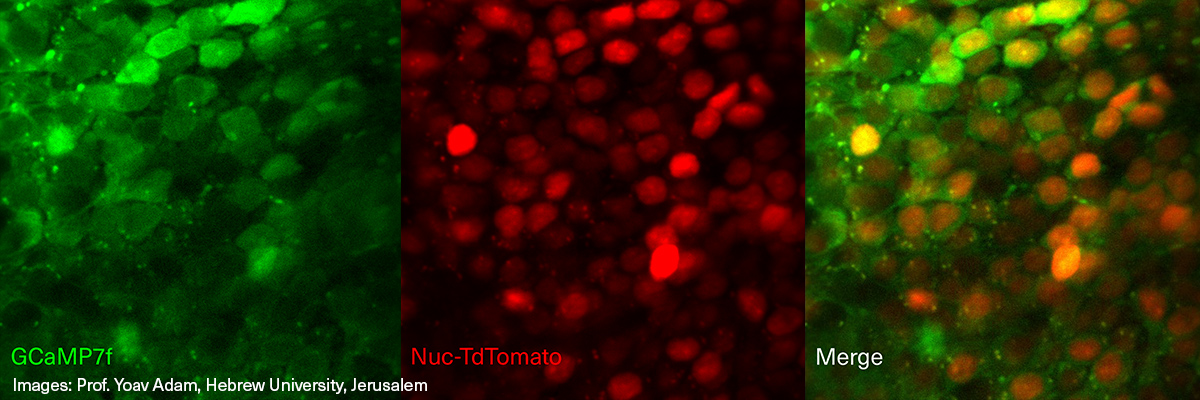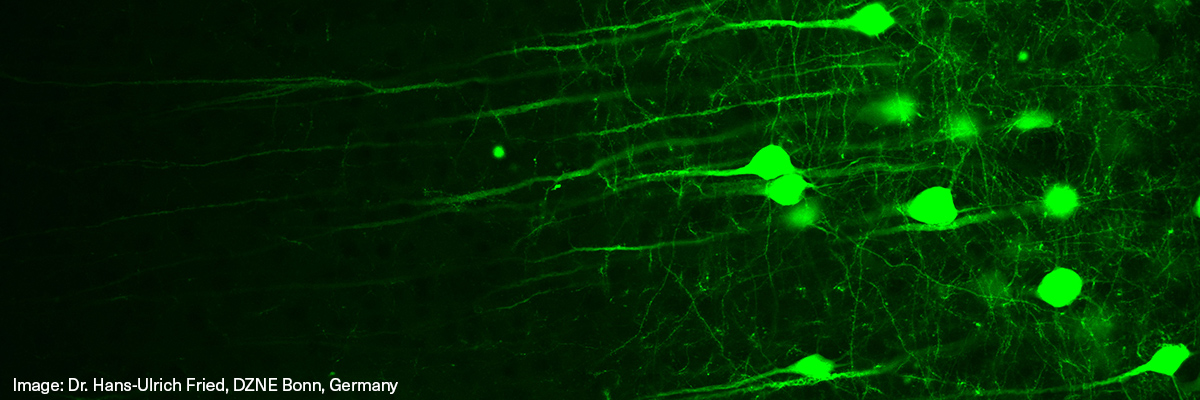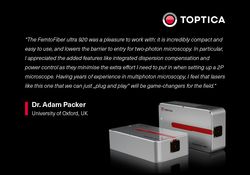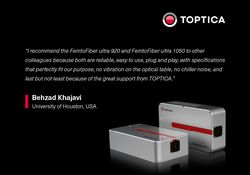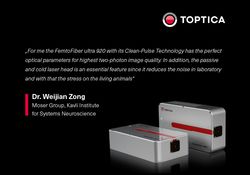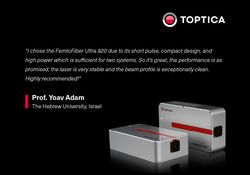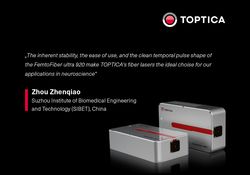Multi-photon microscopy in Neuroscience
Femtosecond fiber lasers for simplifying microscopy
Two-photon fluorescence microscopy is a key technology in biological imaging that enables three-dimensional, non-invasive studies of tissue on the micrometer scale. In contrast to conventional linear fluorescence microscopy, the nonlinear character and the longer excitation wavelength offer larger probing depths and lower phototoxicity.
Both advantages make non-linear fluorescence microscopy an ideal choice for the direct spatiotemporal visualization of neurons and neuronal activity in living animals. The key fluorescent proteins for such experiments are based on green (GFP) and red fluorescent proteins (RFP) that can be excited using 2-photon absorption at 920 nm and 1050 nm, respectively.
Over the last few years, a rapid shift has occurred towards fixed-wavelength mode-locked femtosecond fiber lasers emitting at 780 nm, 920 nm or 1050 nm. These laser systems provide a cost-efficient and easy-to-use alternative for two-photon microscopy applications, especially in neuroscience.
TOPTICA's offer
TOPTICA’s femtosecond fiber lasers provide optimal performance while being easy-to-use. In particular for neuroscience applications, TOPTICA’s FemtoFiber ultra lasers are ideally suited to address biological questions by imaging green (GFP) and red fluorescent proteins (RFP), and are already widely adopted in non-linear microscopes.
In order to achieve the best image quality, TOPTICA’s FemtoFiber ultra is equipped with Clean Pulse Technology that reduces pedestals and side-wings on the temporal pulse profile. Hence, the full laser power contributes to two-photon excitation. Clean Pulse Technology provides highest fluorescence image brightness and contrast while keeping thermal heating of the sample to a minimum.
TOPTICA’s FemtoFiber ultra provides also outstanding usability to scientists: The laser includes beam conditioning to adapt the input laser beam parameters to the microscope. Firstly, software-control of the group delay dispersion (GDD) pre-compensation offers user-friendly optimization of fluorescence signal strength. Secondly, an integrated acousto-optic modulator (AOM) enables fast power-modulation and flyback blanking in synchronization with the beam scanner. This minimizes sample damage and photo-bleaching. Thirdly, the lasers come in an extremely compact, passively cooled package, offering much reduced operating and maintenance cost.
The FemtoFiber ultra 920 and 1050 can now be equipped with femtosecond fiber delivery. This opens new possibilities for integration into modern microscopy set-ups. By eliminating the need for free-space pulse delivery between laser and microscope on an optical table with a simple FC/APC fiber connection, our solution further boosts usability while still providing high performance and maintaining the best fluorescence image quality.
-
Related Products
- References
-
Related Literature
- Scientific Article: Shau Poh Chong and Peter Török, "Influence of laser pulse shape and cleanliness on two-photon microscopy," Opt. Continuum 3, 552-564 (2024)
- Conference Proceeding: Konrad Birkmeier, et al., "Femtosecond fiber delivery at 920 nm for two-photon microscopy", Proc. SPIE 12847, Multiphoton Microscopy in the Biomedical Sciences XXIV, 1284703 (12 March 2024)
- Scientific Article: Samir Saidi, Matthew Shtrahman, “Evaluation of compact pulsed lasers for two-photon microscopy using a simple method for measuring two-photon excitation efficiency“, Neurophotonics, Vol. 10, Issue 4, 044303 (November 2023)
- Scientific Article: W. Zong, et al., Large-scale two-photon calcium imaging in freely moving mice, Cell https://doi.org/10.1016/j.cell.2022.02.017 (2022)
- Scientific Article: Ruihong Dai , et al., High energy (>40 nJ), sub-100 fs, 950 nm laser for two-photon microscopy, Optics Express, Vol. 29, Issue 24 (2021)
- Scientific Article: J. Han, et.al., Robust functional imaging of taste sensation with a Bessel beam, Biomedical Optics Express 12, 5855 (2021)
- Webinar: Setting Up a Simple and Cost-Efficient Two-Photon Microscope for Neuroscience
- Scientific Paper: Simplifying two-photon microscopy (2020)
- Article: TOPTICA Introduces FemtoFiber ultra 920 (2019)
- Application Note: Dr. Max Eisele, Bernhard Wolfring "Next generation two-photon microscopy using the FemtoFiber ultra 920 fiber laser", Physics Today (2019)
- Application Note: Dr. Max Eisele, Bernhard Wolfring "Next generation two-photon microscopy using the FemtoFiber ultra 920 fiber laser" (2019)
-
Downloads
Short Info: FemtoFiber ultra 920
Short Info: FemtoFiber ultra 1050

